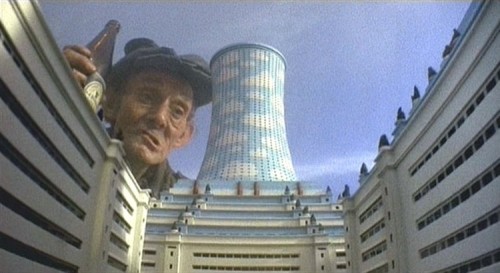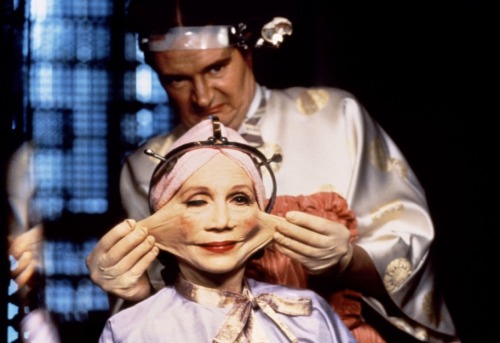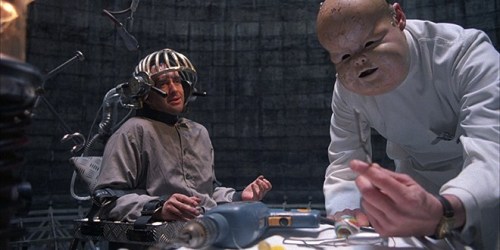Revolution from the Right in Terry Gilliam’s Brazil
Posted By Buttercup Dew On In North American New Right | Comments DisabledBrazil is a 1985 genre-defining science fiction film from acclaimed director and writer Terry Gilliam. It has won numerous awards and is regarded as a cult classic and one of the best science fiction films ever made.This is somewhat of a loose association, as the “science fiction” elements of the film are relatively weak and rarely present, with the substance of the film being an examination of an industrial, consumerist society creaking under excessive bureaucracy – a damning satire on Western Civilization and one of the grimmest dystopias to ever grace the big screen.
The central conflict of Brazil is man against the state, a war of the individual against assimilation. It is directly influenced aesthetically by Fritz Lang’s Metropolis, in its gallows humor and absurdity by Monty Python, and in its bleak pessimism by THX 1138 and Blake’s 7. In the latter two dystopias, the populace had to be drugged into complacency, but in Brazil there is no such soma, and we are introduced to an urbanite, Orwellian, and absurd pastiche of Anglo-Saxon society. The world of Brazil, whilst seemingly entirely white, has run off the rails and become a mechanistic system of collective living. The civilization in Brazil is an aggregate of individual selfishness within a matrix of state-approved rights, responsibilities, and patents; a post-Enlightenment, 1970s society degenerated from classical liberalism into police-state welfare socialism.
The protagonist of Brazil is one Sam Lowry – not average enough to be an everyman, but an embodiment of the more socially awkward, altruistic upper proletarian who finds himself out of place in the rowdiness of the lower classes and the status games of the upper. Brazil as a film squarely targets the self-imagined independent thinker who sees himself outside of the system, and so sits comfortably on the radical Right, despite its superficial glaze of “anti-authoritarianism” and anti-“traditionalism.” Liberals will no doubt read Brazil as the revolt of the individual against “fascism,” but looking through the trappings of shiny helmets and authoritarian architecture, it becomes clear that (intentionally or not) Brazil is a criticism of liberalism and the WASP model, not from the Left but the radical Right.
Lowry is in love with the escapism of daydreams, the only place where he can realize his masculinity. Drifting off, he finds himself muscular, gifted with wings and flight, and emblazoned with face-paint – a display of the class of masculine aesthetics that have found a contemporary home in fashy memes and vaporwave; an extreme, self-aware, fantasy typecasting of the male and manly hero that is not erased or denatured by the vivid advertising colors and technocracy of the modern world, but is in command of them. Unlike the Soyboy Starbucks utopia of effete cosmopolitanism, Lowry longs to become a man empowered by technics; his wings are a contraption that make him a human-powered ornithopter, a sort of technofash Bowie, but upon being awoken by bleeping from a telephone-modem-come-switchboard-clustercuss, he is thrust, wings clipped, back into struggling to get by as a lowly administrative clerk. In Brazil, machines are only extensions of an overbearing bureaucracy, including swivel-eyed security cameras with lethal weaponry, implements of torture, malfunctioning elevators, pneumatic pipes that deliver constant paperwork – or else are consumer gizmos, whatsits, and doomahickeys that run amok. All of them are a menace, save for occasional usefulness in bureaucratic manipulation.
His humdrum existence is upended by a series of cosmic coincidences that make him a fated man. Just as real life is filled with synchronicity and seeming tragic “rightness,” Brazil begins with a bureaucratic error that makes Lowry – already a spiritual nemesis of the system falling into apathy – fated to be its real-life revolutionary opposition. The identity of one Archibald Tuttle, “freelance subversive and heating engineer,” is confused in Information Transit by an insect, causing a machine hiccup. In his place, innocent husband and father Archibald Buttle is taken in a snatch raid that would make the Gestapo blush, and then tortured to death, as his heart condition did not appear in Tuttle’s file.
 [2]Tuttle appears throughout the film as a savior to Lowry, and after a rocky introduction, fixes his overheating apartment, only to reappear when his apartment is sabotaged by boiler-suited gremlins from Central Services, little plebes who exploit the remoteness of the bureaucratic system to inflict this environmental torture for the sadistic pleasure of having him completely under their thumb. Tuttle swaps their air-feed for the sewage feed, drowning the pair in bubbling feces. Tuttle is a man of action, having left Central Services because he “couldn’t stand the paperwork,” smoking cigars and brimming with mustachioed machismo. Tuttle traverses the dystopia of Brazil through zip-lines – disappearing between tower blocks like a paramilitary shock troop. To my mind, the image of Tuttle zipping into the darkness echoes the Italian Futurist celebration of speed and action; it is passingly similar to the famous Tullio Crali painting, Before the Parachute Opens.
[2]Tuttle appears throughout the film as a savior to Lowry, and after a rocky introduction, fixes his overheating apartment, only to reappear when his apartment is sabotaged by boiler-suited gremlins from Central Services, little plebes who exploit the remoteness of the bureaucratic system to inflict this environmental torture for the sadistic pleasure of having him completely under their thumb. Tuttle swaps their air-feed for the sewage feed, drowning the pair in bubbling feces. Tuttle is a man of action, having left Central Services because he “couldn’t stand the paperwork,” smoking cigars and brimming with mustachioed machismo. Tuttle traverses the dystopia of Brazil through zip-lines – disappearing between tower blocks like a paramilitary shock troop. To my mind, the image of Tuttle zipping into the darkness echoes the Italian Futurist celebration of speed and action; it is passingly similar to the famous Tullio Crali painting, Before the Parachute Opens.
The Buttles had eked out a homely, traditionalist existence in their flat, nestled in the slum of Shangri-La Towers. The introductory shot shows a model of the tower blocks (with nuclear powerplant-type cooling vents lovingly painted sky blue with clouds) being loomed over by a street drunk – a sharp criticism of the modernist architectural wave of the 1960s and the idea of the person-as-commodity that animates both Western capitalism and Soviet Communism; in the words of Corbusier, the home is now “a machine for living in.” Despite the great strides the modernizers across the West and in Gilliam’s Brazil have made in erasing time-tested wisdom, historical consciousness, and ethnic heritage from architecture, they have completely failed to erase the social ills that plague society, exacerbating them beyond all sense by reducing the individual to an atomized legal entity in a grinding monolith. Ironically, in England, it was this futurist utopianism that gave birth to a great number of public lidos, which have since fought a losing battle to stay profitable. In both real life and Brazil, radicalism from both Left and Right has been usurped by managerialism veneered by a pseudo-Christian morality.
In his dreams, Lowry is drawn to the cries of distress of a beautiful damsel imprisoned by hobbling monsters; as he is increasingly driven to dysfunction, tower blocks erupt from the green and pleasant dreamscape and imprison him in a sterile, cancerous urban hellscape. As he ventures through the improper channels to deliver a check to Mrs. Buttle for a misapplied heating bill (as part of being taken advantage of by his weak-willed, self-serving supervisor Kurtzmann), he encounters the girl of his dreams in reality – something that finally goads him into accepting the promotion he has so steadfastly refused – in order to track her down properly.
He has to turn (despite his disgust) to his mother and her ridiculous social circle of twittering freaks to access Eugene Helpmann, head of Information Retrieval (a tidy euphemism for torture), to plead for the promotion his supervisor Kurtzmann has turned down on his behalf. Lowry’s mother knows “simply everybody” and is obsessed with restoring her youth through plastic surgery. Her surgeon is vulgar and classless, speaking loudly and drunkenly about “me and my little knife” (pronounced knoife) and Sam’s mother’s body. One of his mother’s friends is similarly obsessed with restoring her beauty and is progressively being dissolved in acid by a “pioneering” cosmeticist, simpering about how such wonderful skin tones can be achieved with this “technique,” her body disintegrating even as she remains ever-faithful to the empty promises of fashion and novelty.
At the first gathering of Sam with his mother and her friends, the bombing campaign afflicting this blighted society strikes again; waiters bustle over the dead and dying and the band strikes up “Hava Naguila.” What could be more comically pathetic to a self-serving Jew than the stupid goyim bustling over frivolities and refusing to notice the bleeding and obliterated, even as they themselves were mere feet from becoming victims themselves? Our masters, of course, never engage in this “high” society or its absurdities, the grotesque spectacle of classless[1] [5] whites desperate to outdo each other in status symbols, trinkets, and baubles (Lowry’s mother is repeatedly seen wearing a hat shaped like an upside-down shoe). They merely supply it to the craven and degenerated goyim, whilst living in a separate, parasitic, and underground society of their own.[2] [6]
Information Retrieval, he finds, is a “crack team of decision-makers” who relentlessly pursue their manager to make decisions for them. A cupboard-like room becomes a numbered cell, and he has to wrestle to prevent his table being stolen (through the wall!) by his odious and manic neighbor, Lime. “A girl, eh?” he repeatedly jibes. Jill Layton, Lowry’s dreamboat, is a trucker with cropped hair, work duds, and a leather jacket that fulfills a punk-grrl power archetype. She kicks him out of her cab on their first encounter. The feminist archetype and post-apocalyptic currents apparent in Brazil (1985) and Mad Max (1979) are synthesized and repeated in much lesser, later films of the genre – notably Tank Girl in 1995. Tank Girl, an ugly punk played by Lori Petty, fights against the oppressive “Water and Power” corporation with her mutant sidekick.[3] [7] Contra the perpetually adolescent and barren Tank Girl, Layton works as a trucker; when she and Lowry are able to snatch some time together in private and consummate their relationship, she blossoms (with the assistance of a stolen wig) into a woman. Her truck is first seen carrying a prefab home, something that makes a later appearance as a traditional cottage. It is her break with the state and her de-gendering, mechanistic job that liberates her femininity.
Having discovered she is wanted for terrorism offenses through his paranoid friend and career torturer Jack Lint, he rushes to save her, and falls headlong into a chaotic, tumbling run from the authorities into the welcoming arms of dissidence. As Lowry becomes progressively more detached from his mundane existence and attached to Layton, the hallucinations which are his link to his daydreams of liberation begin to intrude more and more, causing him to behave increasingly erratically – but perhaps no more erratically than Lint, his friend and opposite number in Information Retrieval, who simply adapts to his boss mistaking his wife, Allison, for Barbara by calling her Barbara from then on.
Lint (played by Michael Palin) is presumably an Aryan who has learnt to the play the Semitic game of status, cunning, and social manipulation: “You’ll never get anywhere wearing a suit like that.” He gives no indication that he enjoys his work as a torturer, but rather accepts it with blithe indifference as part of getting ahead. Completely clueless as to the source of the terrorist bombings (“now in their thirteenth year”) he imagines that Layton “must be working for somebody,” as she has been “making allegations” and running around trying to find who was responsible for snatching the innocent Buttle – even though Lint is fully aware that Buttle was innocent. “Cause and effect,” indeed. Oblivious to his own obliviousness, and utterly deaf to Lowry’s emotional pleas that Jill is innocent, he simply drops him as a friend and becomes another anonymous, black-hatted salaryman.
The bombings, of course, are never explained other than being said to be the work of “terrorists.” They exist in Brazil as a means to accelerate the plot, justify the state’s use of torture and lethal force, and to demonstrate how anaesthetized and complacent the population has become (with all potential dissidents, like Lowry, already under deep investigation). Intentional or not, this state exists in Britain today; in all public discourse, Islamic terrorism must always be ascribed to “extremists” and “radicals,” and allowed no further political significance; bomb blasts, stabbing sprees, and acid attacks are chalked up to be the work of lone madmen with no ideological impetus. Like Lint and the state in Brazil, the British government is more concerned with chasing “freelance subversives” like YouTubers, people singing the “Osama Bin Laden” song, and the protest group National Action.
With the film’s cast of heroes and villains fully assembled – from carol-singing policemen and Buttle’s broken wife and traumatized children to the collection of grotesques that make up the manipulative upper echelons of the machine, Gilliam’s trap is sprung, and Lowry is snatched for torture, while Jill is killed while resisting arrest (despite Lowry’s success in erasing her from the state’s computer system). The final sequence begins with Lowry the dreamer and man of emotional depth and longing confronted by Lint, who is furious that Sam has disgraced himself (and him, by association).
As Lint is about to force a needle into Sam’s eye, he is shot in the head, and paramilitary forces descend to rescue Sam. Archibald Tuttle and his comrades wage a gunfight and pull Sam out of the torture chair, battling their way out of the building at the cost of all of Tuttle’s men – but once outside, Tuttle offers Sam a detonator, and they blow up the hated Ministry of Information. But as they make their escape, Tuttle is caught by paperwork blowing in the breeze, and eventually he is covered and swallowed by it. Sam flees the police to a church, where a funeral service for his mother’s friend – now fully dissolved in acid and a pile of mush and bone – is taking place. His mother has been fully restored to youth and takes on the form of Jill Layton when Lowry looks directly at her, but when the camera cuts away to Lowry’s escape through the coffin, the actors are switched, and Lowry’s actual mother momentarily appears.
Lowry plunges through the coffin into the barren streets of his nightmares. Fleeing from police, shambling citizens enslaved to the Ministry, Information Retrieval agents, Buttle’s traumatized mother, and Eugene Helpmann, the crippled Deputy Head of the Ministry (dressed as Santa for Christmas), he clambers over a pile of concrete ruins and the ever-present ducting. Grasping a door handle in a brick wall, he escapes, slamming the door behind him and holding it shut against the terrors.
To his amazement and joy, he finds himself in the prefab home that Jill was towing on the back of her truck. Together, they escape the sterile city and industrial wasteland to green and pleasant fields far, far away and begin anew – to the soaring, recurrent theme of “Aquarela do Brasil,” their prefab home shown as a cottage, independent and free, settled in amongst a small farm with a cow and the truck being used to grow produce – before Eugene Helpmann and Jack Lint loom before the scene, the music stopping jarringly.
The words are chosen masterfully: “He’s got away from us, Jack.” And indeed, Sam has – nearly catatonic, but humming the title theme, his escape a fantasy delusion to which his conscious mind has fled. Materially captured, he is yet spiritually liberated; “I think you’re right, Mr. Helpmann. He’s gone,” Lint replies.
Lowry’s ambition throughout is to strike at the confines of bureaucracy, the inversion of the natural order and crass materialism. Whilst seemingly an everyman, against the sharp relief of the egalitarian, pencil-pushing system, he becomes a man who craves the liberation of the radical Right and becomes its representative. The whole edifice is upheld by complacency, mediocrity, and false, self-serving virtue – clearly recognizable today as the pseudo-morality of getting ahead at others’ expense in private, yet demonstrating supposedly refined tastes in public.
Helpmann of the Ministry of Information urges people to “play the game,” condemning terrorism as “bad sportsmanship.” There is no presence of the political even as innocents are slaughtered indiscriminately. The overbearing state that regulates and monopolizes every aspect of life is overwhelmingly Leftist, yet has the trappings of authoritarianism that would have Leftists in hysterical howls of anguish. The social conservatism is completely moot as there is no presence of any kind of minority – sexual, racial, or otherwise in the film – despite being made in the mid-1980s, after the burgeoning of Rock against Racism in 1976 as a landmark in British racial history. Like today, there is no “fascism” of unifying identity or traditional mores; only unfettered, denaturing state capitalism, propped up by a pearl-clutching, bourgeoisie phobia of vigilantism and political liberty.
This hard shell of a state is a regulatory system that enforces mediocrity. Brazil’s critique is that Rightist values of greatness, gender ideals, national pride, and an excellence derived from traditionalist rootedness (Lowry’s dream) or fascistic action and heroism (Tuttle’s paramilitarism) is impossible to achieve under a bureaucracy that regulates all aspects of life. Gilliam rages against the little men of the world who leverage legal power to enact vengeance on society, and the complacent, empty-headed nothings who go along with it – from Helpmann and Lint to Lowry’s disgusting mother and Lint’s secretary, all of which are “playing the game” as it is presented to them. It is a system that assimilates human material and degrades it to the lowest condition, taking men that would be heroes worthy of myth in other eras and reducing them to beaten-up desk jockeys, and the publicly insensitive, and taking women with faces that would launch a thousand ships and chaining them to a desk. Abstracts like truth, beauty, nobility, and heroism are the watchwords of the Right, and impossible to realize in a Leftist, commodifying world like Brazil’s.
This arrogant managerialism (breathtaking in its chutzpah) has to be brought down, or at the very least gotten away from. Escaping from the clutches of the Ministy of Mediocrity means looking down on the materialistic mores and mawkish morality of the mainstream, going over instead to uncompromising radicalism. Lowry’s final vision is a mere dream; but what a dream it is: harmonious, timeless, and beautiful.
Notes
[1] [9] Classless in the sense that our society has been shorn of any aristocratic, racial dimension (the two elements going hand in hand, and a refusal to acknowledge racial pedigree as being an abdication of one’s aristocratic class, i.e. Meghan Markle) and so purely materialistic, egalitarian, and given to chasing fads.
[2] [10] Which has an art and cultural scene centered on depravity and mocking healthy norms – for example, Ryan McGinness, an artist featured in the Saatchi Gallery, who held fifty consecutive parties featuring his work as part of an “arts” project, of which John Podesta was an attendee and who was photographed covered in luminescent body paint. McGinness’ work can only be described as psychedelic past the point of being deranged, and Podesta is of Pizzagate ill-repute. McGinness was featured in USA Today: American Art from the Saatchi Gallery (2006), the editor of which was one Normal (((Rosenthal))). This is but one link in the spider-web-world of the international arts market and the Semitic scene.
[3] [11] Whilst Petty’s ethnicity is denoted merely as “American,” she later played a Jewess Deputy Sheriff in the cop film The Glass Shield in 1994. “Nearly all the white characters are hypocrites or downright meanies,” Variety said [12]. “The Glass Shield emerges as a powerful moral drama that tries to deal with racism.”
Source: https://buttercupdew.tumblr.com/post/177492974848/revolution-from-the-right-in-terry-gilliams [13]



